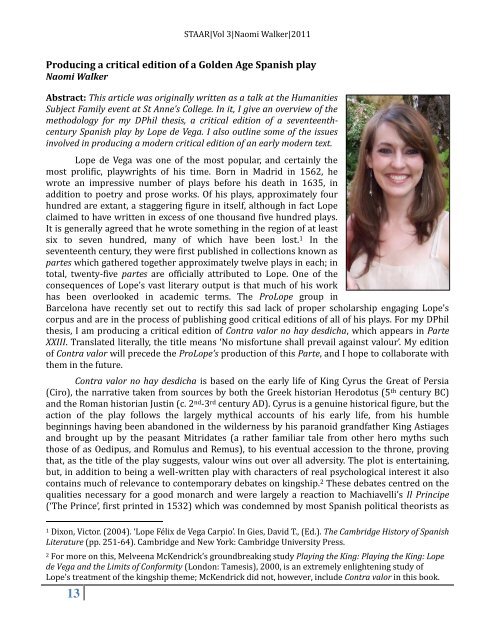STAAR Volume 3 - St. Anne's MCR
STAAR Volume 3 - St. Anne's MCR
STAAR Volume 3 - St. Anne's MCR
You also want an ePaper? Increase the reach of your titles
YUMPU automatically turns print PDFs into web optimized ePapers that Google loves.
13<br />
<strong>STAAR</strong>|Vol 3|Naomi Walker|2011<br />
Producing a critical edition of a Golden Age Spanish play<br />
Naomi Walker<br />
Abstract: This article was originally written as a talk at the Humanities<br />
Subject Family event at <strong>St</strong> Anne’s College. In it, I give an overview of the<br />
methodology for my DPhil thesis, a critical edition of a seventeenthcentury<br />
Spanish play by Lope de Vega. I also outline some of the issues<br />
involved in producing a modern critical edition of an early modern text.<br />
Lope de Vega was one of the most popular, and certainly the<br />
most prolific, playwrights of his time. Born in Madrid in 1562, he<br />
wrote an impressive number of plays before his death in 1635, in<br />
addition to poetry and prose works. Of his plays, approximately four<br />
hundred are extant, a staggering figure in itself, although in fact Lope<br />
claimed to have written in excess of one thousand five hundred plays.<br />
It is generally agreed that he wrote something in the region of at least<br />
six to seven hundred, many of which have been lost. 1 In the<br />
seventeenth century, they were first published in collections known as<br />
partes which gathered together approximately twelve plays in each; in<br />
total, twenty-five partes are officially attributed to Lope. One of the<br />
consequences of Lope’s vast literary output is that much of his work<br />
has been overlooked in academic terms. The ProLope group in<br />
Barcelona have recently set out to rectify this sad lack of proper scholarship engaging Lope’s<br />
corpus and are in the process of publishing good critical editions of all of his plays. For my DPhil<br />
thesis, I am producing a critical edition of Contra valor no hay desdicha, which appears in Parte<br />
XXIII. Translated literally, the title means ‘No misfortune shall prevail against valour’. My edition<br />
of Contra valor will precede the ProLope’s production of this Parte, and I hope to collaborate with<br />
them in the future.<br />
Contra valor no hay desdicha is based on the early life of King Cyrus the Great of Persia<br />
(Ciro), the narrative taken from sources by both the Greek historian Herodotus (5 th century BC)<br />
and the Roman historian Justin (c. 2 nd -3 rd century AD). Cyrus is a genuine historical figure, but the<br />
action of the play follows the largely mythical accounts of his early life, from his humble<br />
beginnings having been abandoned in the wilderness by his paranoid grandfather King Astiages<br />
and brought up by the peasant Mitridates (a rather familiar tale from other hero myths such<br />
those of as Oedipus, and Romulus and Remus), to his eventual accession to the throne, proving<br />
that, as the title of the play suggests, valour wins out over all adversity. The plot is entertaining,<br />
but, in addition to being a well-written play with characters of real psychological interest it also<br />
contains much of relevance to contemporary debates on kingship. 2 These debates centred on the<br />
qualities necessary for a good monarch and were largely a reaction to Machiavelli’s Il Principe<br />
(‘The Prince’, first printed in 1532) which was condemned by most Spanish political theorists as<br />
1 Dixon, Victor. (2004). ‘Lope Félix de Vega Carpio’. In Gies, David T., (Ed.). The Cambridge History of Spanish<br />
Literature (pp. 251-64). Cambridge and New York: Cambridge University Press.<br />
2 For more on this, Melveena McKendrick’s groundbreaking study Playing the King: Playing the King: Lope<br />
de Vega and the Limits of Conformity (London: Tamesis), 2000, is an extremely enlightening study of<br />
Lope’s treatment of the kingship theme; McKendrick did not, however, include Contra valor in this book.


